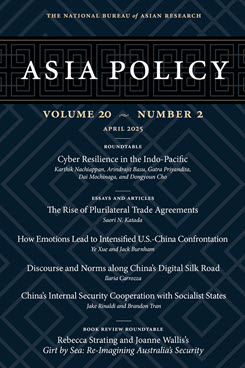Essay in Asia Policy 20.2
The Rise of Plurilateral Trade Agreements and the Future of Trade in the Indo-Pacific
This essay argues that two plurilateral free trade agreements (FTAs), the Comprehensive Progressive Agreement for Trans-Pacific Partnership (CPTPP) and the Regional Comprehensive Economic Partnership (RCEP), hold the key to maintain the open regional trade order and asks whether they can rise to the challenge.
Note: This is the fourth in a series of four essays in 2024–25 on trade and supply chains in Asia made possible by the generous support of the Hinrich Foundation.
EXECUTIVE SUMMARY
MAIN ARGUMENT
Since their establishment, the CPTPP and RCEP have occupied important spaces in the Indo-Pacific and global trade order by extending membership and rules, providing a steady foundation for connectivity and economic activities, empowering small and medium-sized states, and influencing the behavior of the great powers, the U.S. and China. These functions help maintain the long-standing rules-based order in the face of a paradigm shift toward economic security reshaping the global economic landscape. This shift has been a result of extraordinary challenges in the first half of the 2020s, including the Covid-19 pandemic, massive supply chain disruptions, wars in Europe and the Middle East, economic coercion, the U.S.-China technology and trade wars, and domestic political pressures for protectionism and deglobalization. During this time, the U.S. government has demonstrated little interest in remaining the guardian of the open trade and rules-based order. With President Donald Trump resuming the U.S. presidency in 2025 and emphasizing his “America first” policies, the Indo-Pacific region’s small and medium powers face the difficult task of using these mega-FTAs as a foundation on which to create a coalition to support the rules-based economic order without U.S. backing.
POLICY IMPLICATIONS
- The CPTPP and RCEP have respectively provided regional alternatives to the World Trade Organization (WTO) to support the rules-based trade and investment order, despite the U.S. absence in a time when economic security concerns prevail.
- The WTO continues to face challenges in updating its rules, especially given the Trump administration’s disregard for multilateralism.
- As the CPTPP and RCEP grow, they will need to address challenges over membership accession, utilization rates, and evolving geoeconomic issues such as strengthening supply chains and digital trade.
- Further disruption introduced by Trump 2.0 will require even more proactive engagement from small and medium powers if they are to protect the open and rules-based trade order.
Saori N. Katada is Professor of International Relations and the Director of the Center for International Studies at the University of Southern California (United States). She is the author of Japan’s New Regional Reality: Geoeconomic Strategy in the Asia-Pacific (2020).
About Asia Policy
Asia Policy is a peer-reviewed scholarly journal presenting policy-relevant academic research on the Asia-Pacific that draws clear and concise conclusions useful to today’s policymakers. Asia Policy is published quarterly in January, April, July, and October and accepts submissions on a rolling basis. Learn more


